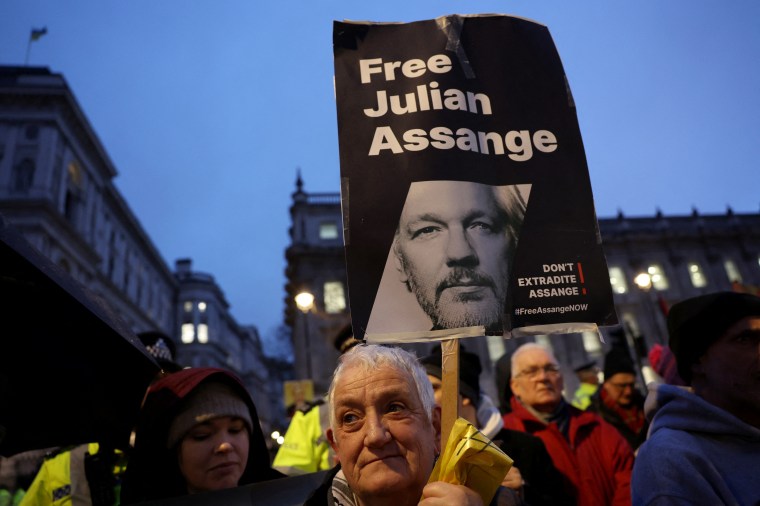The Australian founder of the website WikiLeaks, Julian Assange, has been fighting extradition to the U.S. from the U.K. since 2019 on charges that could strike a blow to press freedom globally.
Here is CPJ’s briefing on the legal battle to extradite Assange, the charges he would face in the U.S., and why his prosecution is worrying for journalists in the U.S. and internationally.
What are the charges against Assange?
The 18 indictments against Assange stem from WikiLeaks’ obtainment and publication in 2010 of some 400,000 classified U.S. military documents relating to its involvement in wars in Iraq and Afghanistan. These leaks— the largest security breaches of their kind in U.S. military history—included a video showing the 2007 killing in Iraq of two Reuters journalists by a U.S. military airstrike.
Prosecutors allege that Assange unlawfully published the names of classified sources and conspired with former U.S. Army intelligence analyst Chelsea Manning to obtain classified information.
Manning was convicted in 2013 on espionage charges and served seven years in a military prison before President Barack Obama commuted the remainder of her sentence in 2017. Manning was again jailed in 2019 for refusing to testify before a grand jury investigating WikiLeaks and freed in 2020, as the judge said her detention was no longer serving “any coercive purpose.”
Seventeen of the charges against Assange are under the 1917 Espionage Act, which has been increasingly used by the Department of Justice to prosecute whistleblowers, CPJ has documented. The other charge, under the Computer Fraud and Abuse Act, is that Assange “encouraged” Manning to leak classified information.
If extradited and convicted in the U.S., Assange’s lawyers have said that he faces up to 175 years in prison, although U.S. prosecutors have said the sentence would be much shorter.
When did the U.S. government indict Assange?
The Justice Department in April 2019 unsealed an indictment accusing Assange of computer hacking under the Computer Fraud and Abuse Act. In May 2019, Assange was indicted on 17 counts of violating the Espionage Act for his role in obtaining and publishing classified U.S. government material. In June 2020, the U.S. filed a superseding indictment against Assange that broadened the scope of the computer hacking charges.
While the leaks in question in these indictments were published while President Barack Obama was in office, his Justice Department notably declined to file charges against Assange due what it termed a “New York Times problem”—namely if it indicted Assange, a legal pathway would be created for the Justice Department to prosecute The New York Times, The Guardian, Der Spiegel, and other media outlets that published the classified logs. This could allow for the prosecution of any journalists who publish leaked documents.
What’s at stake for journalism?
CPJ has long spoken out against the prosecution of Assange and the implications for press freedom globally, and repeatedly called for the charges to be dropped, including in a 2010 letter to Obama and Attorney General Eric Holder.
While Assange’s controversial diplomatic and military leaks have named and endangered vulnerable journalists, U.S. prosecution efforts have been described as “holding a gun to the head of investigative journalism.”
The arguments used in the indictments against Assange could establish a legal pathway for the prosecution of journalists and severely weaken the First Amendment, which guarantees freedom of the press. Journalists’ right to report on matters of public interest without fear of censorship or retribution could be harmed.
If Assange were found guilty of violating the Computer Fraud and Abuse Act, it could facilitate the criminalization of investigative journalists’ interactions with their sources.
If Assange is extradited and prosecuted in the U.S. under the Espionage Act, it would allow the U.S. government to extradite any publisher of classified information from any country with which the U.S. has an extradition agreement. It would set a harmful precedent for governments worldwide, establishing a framework whereby states can pursue journalists through the courts, no matter where they are located.
Furthermore, the prosecution of Assange in the U.S. would be a gift to authoritarian leaders who could cite Washington’s example the next time they wanted to jail an irksome journalist or publisher.
How did Assange end up in the U.K.?
Assange sought asylum in the Embassy of Ecuador in London in 2012 to avoid extradition to Sweden where he was wanted for questioning on allegations of rape and sexual assault, which he denied. Assange’s legal team feared he would be handed over for onward extradition to the U.S. for prosecution.
Assange’s lawyers told the British High Court this month that the Trump administration planned to kidnap or kill Assange to “sustain impunity for US officials in respect of the torture/war crimes committed in its infamous ‘war on terror’…”
After falling out with the Ecuadorian government, Assange was evicted from the country’s embassy in April 2019, arrested by the British police for skipping bail, and imprisoned, pending the conclusion of the U.S. extradition case.
What’s next?
The British High Court is not expected to rule on Assange’s final application to appeal until March at the earliest.
If successful, Assange will be allowed to appeal on the grounds that his extradition would be a breach of the extradition treaty between the U.S. and the U.K., which prohibits doing so for political offences.
If Assange loses at the High Court, he will have 28 days to file an appeal at the European Court of Human Rights, one of his lawyers, Jennifer Robinson, said during a briefing on the case. If Assange was granted provisional measures, it would prevent the U.K. from extraditing him until a ruling from the ECHR.
